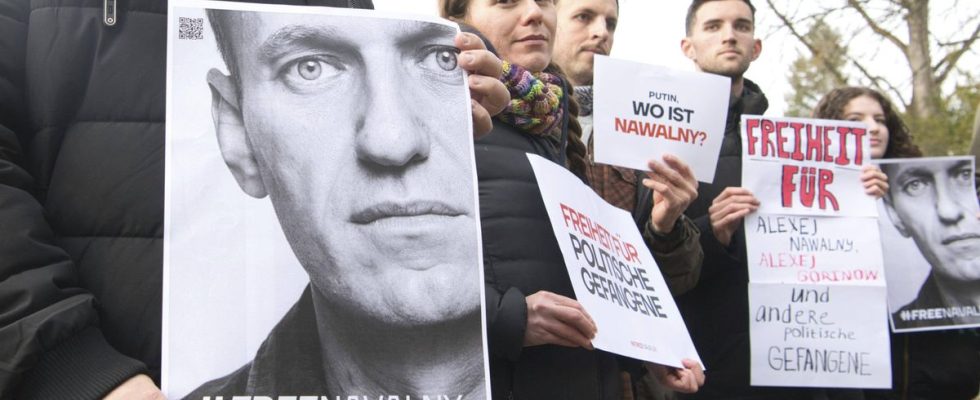How to win an election for sure? By throwing all his opponents in prison, obviously. The recipe has been tested and approved in Russia, led by Vladimir Putin for… so long that we don’t really know anymore (2000 in fact). As a new presidential election looms in the cold country, almost all of the president’s political opponents (and sometimes their lawyers) have been thrown in prison or driven into exile. After almost a quarter of a century in power, Vladmir Putin, who announced last week that he was a candidate for a fifth term, will undoubtedly be re-elected.
Because the fate reserved for his opponents can only dissuade potential candidates from running. Take the case of Alexeï Navalny, 47 years old. The anti-corruption activist was sentenced, on August 4, 2023, by a Moscow court to 19 years in prison for “extremism”, after a closed-door trial. A sentence that he must serve in a “special regime” colony, the category of establishments where the conditions of detention are the harshest and which are usually reserved for lifers and the most dangerous prisoners.
His relatives without news
Arrested in January 2021, Alexeï Navalny, 47, had until now been serving his sentence in the Vladimir region, around 250 km east of Moscow. He was very often placed in solitary confinement, in retaliation for alleged violations of prison rules. Last week, his team launched a social media campaign to call on Russians to vote against Vladimir Putin in the next presidential election. Coincidence or consequence? At the same time, he was taken from his prison to an unknown destination. “We do not know to which destination exactly,” wrote on X (ex-Twitter) its spokesperson, Kira Iarmich, specifying that this transfer would have taken place on December 11.
His relatives have not heard from the opponent since December 6. It must be said that transfers from one penal colony to another in Russia often take several weeks of travel by train with stages, with the prisoners’ relatives remaining without information during this period. This sudden disappearance has in any case aroused concern in several Western capitals. On Friday, a spokesperson for French diplomacy called on Moscow to ensure “the health of its detainees, in particular political prisoners”. The European Union reiterated its call for the “immediate” release of Alexeï Navalny while the White House said it was “very concerned”.
Prison, poisoning…
Why so much persistence? In the winter of 2011, Alexeï Navalny took the lead in the movement to protest the legislative elections won by the ruling party. The rallies are on an unprecedented scale since Putin came to power in 2000. He received his first prison sentences and created the Anti-Corruption Foundation (FBK). On July 18, 2013, he was sentenced to five years in camp for embezzlement of money to the detriment of Kirovles, a logging operation in the Kirov region (west). Denouncing a political trial, he obtained a suspended sentence on appeal.
He gradually became the face of the opposition and obtained 27.2% of the votes in the election for Moscow mayor in September 2013, against the outgoing mayor close to Putin. Two years later, his party, the Progress Party, was banned. In 2018, he ran for president, but the electoral commission declared him ineligible for his conviction in the Kirovles case. On August 20, 2020, he came close to death. Hospitalized in serious condition in Siberia, he was transferred in a coma to Berlin at the request of his relatives. On September 2, Berlin concluded that there had been poisoning by a “Novichok-type” substance, a neurotoxic product developed for military purposes during the Soviet era. Navalny accuses Putin. “Unacceptable” for Moscow.
On the list of “terrorists and extremists”
Returning to Russia after his convalescence, he was arrested upon landing in Moscow on January 17, 2021. A few weeks later, the courts converted his former suspension for “fraud” into a firm sentence of two and a half years. He was sent to a penal colony in Pokrov, 100 km east of Moscow. At the same time, his anti-corruption organization FBK was closed for “extremism”. On October 20, 2021, he received the Sakharov Prize for defending freedom of thought. But in Russia, he joins the list of “terrorists and extremists”. Found guilty of “fraud” and “contempt of court”, he was sentenced on March 22, 2022 to nine years in prison and transferred to a prison 250 km east of Moscow, from where he still defends the invasion of Ukraine.
After his sentence to 19 years in prison, the Russian authorities initiated new proceedings against him. This time, for “vandalism”. Which could add three additional years of detention to his sentence.

